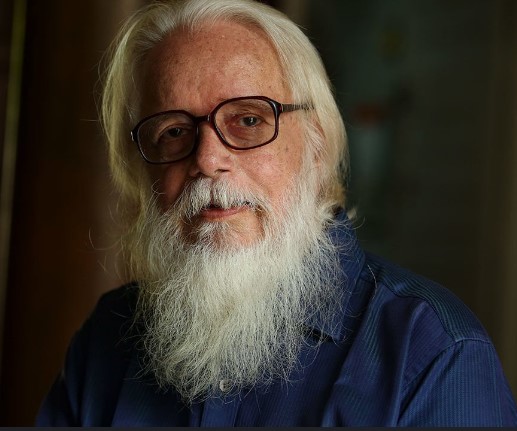The Central Bureau of Investigation (CBI) has revealed shocking new details in the 1994 ISRO espionage case, uncovering that the case was fabricated by a Kerala Police officer to conceal his own misconduct. The false allegations led to the wrongful implication of former ISRO scientist Nambi Narayanan and others. The CBI now claims that the espionage case was concocted by a then-special branch officer, S Vijayan, to justify his illegal detention of a Maldivian woman after she rejected his advances.
The Fabrication Unveiled
In its chargesheet filed in late June and made public on Wednesday, the CBI accused S Vijayan, who retired as a Superintendent of Police, of orchestrating the entire espionage case. According to the CBI, Vijayan seized the travel documents and air tickets of Mariyam Rasheeda, a Maldivian national, preventing her from leaving the country after she spurned his advances. Vijayan put Rasheeda and her companion Fauzia Hasan under surveillance after learning that she was communicating with ISRO scientist D. Shasikumaran.
Baseless Allegations and False Charges
Vijayan reported the two women to the Subsidiary Intelligence Bureau (SIB). However, SIB officers found nothing suspicious during their examination. Despite this, Rasheeda was arrested under the Foreigners Act for overstaying in India without a valid visa. When her custody was nearing expiration, Vijayan filed a false report, leading to Rasheeda and Hasan being charged under the Official Secrets Act. A Special Investigation Team (SIT) was assigned their custody in order to look into the claims of espionage.
Wrongful Arrests of ISRO Scientists
Following these fabricated charges, the SIT arrested four ISRO scientists, including Narayanan. The CBI chargesheet states that the entire espionage case was a gross “abuse of law right from the initial stage,” beginning with Rasheeda’s illegal detention and framing. To cover up these actions, more serious charges were fabricated against Narayanan and others, perpetuating a cycle of wrongful imprisonment and malicious prosecution.
Legal and Criminal Actions Against Former Officers
The CBI has recommended the prosecution of former Director Generals of Police (DGPs) RB Sreekumar and Siby Mathews, former Superintendents of Police (SPs) S Vijayan and KK Joshua, and ex-intelligence officer PS Jayaprakash. They face charges under various provisions of the Indian Penal Code (IPC), including criminal conspiracy (Section 120B), wrongful confinement (Section 342), voluntarily causing hurt (Section 323), extracting a confession through force (Section 330), framing incorrect documents (Section 167), giving false evidence (Section 193), and outraging the modesty of a woman (Section 354). However, the CBI did not recommend prosecuting the other 13 accused due to a lack of evidence.
Nambi Narayanan’s Response
Narayanan, who has been fighting a legal battle for over 20 years to clear his name, expressed his indifference to the punishment of the officers named in the chargesheet. “They have already been punished. They are already suffering. I disagree that they ought to be imprisoned. They don’t even need to apologize to me. Narayanan told reporters, “If they had just acknowledged that they were wrong, I would have been happy.” His primary concern was proving his innocence and uncovering the conspiracy against him.
Supreme Court’s Intervention
The case regarding the conspiracy to frame Narayanan was registered in 2021 following directions from the Supreme Court. On April 15, 2021, the Supreme Court of India ordered the CBI to examine the report of a high-level committee on the role of the erring police officials in the 1994 espionage case. This led to the revelation that the Kerala Police had registered two cases in October 1994 against Rasheeda, alleging she had obtained secret ISRO rocket engine drawings to sell to Pakistan. Along with Fousiya Hasan, Rasheeda’s acquaintance from the Maldives, and D. Sasikumaran, the deputy director of the space agency at the time, Narayanan, the then-director of ISRO’s cryogenic project, was also taken into custody.
False Allegations Uncovered
The CBI’s investigation ultimately found all allegations against Narayanan and the other accused to be false. The Supreme Court acknowledged the wrongful imprisonment, malicious prosecution, and humiliation suffered by Narayanan, awarding him compensation of Rs 50 lakh. This significant financial restitution, however, cannot erase the decades of suffering endured by Narayanan and his colleagues.
Implications and Reflection
The revelations in the CBI chargesheet highlight a severe misuse of power and the devastating impact of personal vendettas on justice. This case serves as a stark reminder of the potential for corruption within the law enforcement system and the importance of accountability and oversight. The wrongful imprisonment and malicious prosecution of Narayanan and others underscore the critical need for reform and vigilance in the pursuit of justice. As the legal proceedings continue, the hope is that those responsible for this miscarriage of justice will be held accountable, ensuring such travesties do not occur in the future.




